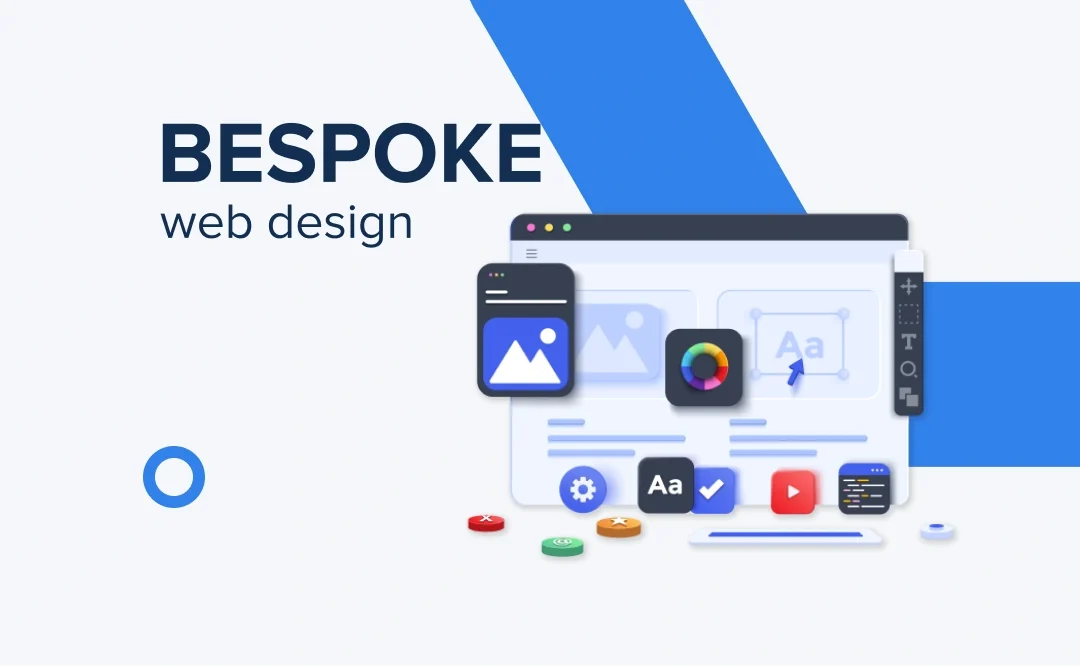A bespoke website is more than just a digital presence—it’s a tailor-made solution that reflects your brand’s personality and meets its specific needs. Unlike generic templates, bespoke websites are built from the ground up to deliver unique functionality and superior performance. To help you maximize your investment, we’ve compiled the 10 features every bespoke website must include to ensure it stands out and drives results.
Custom Design and Branding
A bespoke website starts with a unique design that aligns perfectly with your brand identity.
Why It’s Essential:
Your website serves as the digital face of your business. A custom design ensures your color palette, typography, and overall layout reinforce your brand’s personality.
How to Achieve It:
- Collaborate with professional designers to craft a layout tailored to your target audience.
- Include distinctive visual elements like logos and taglines that make your website unforgettable.
Investing in a cohesive and visually appealing design boosts user trust and brand recognition.
Responsive Design
In an era dominated by mobile browsing, a responsive website is non-negotiable.
Why It’s Essential:
Over 50% of global web traffic comes from mobile devices. A responsive design ensures your site looks and functions flawlessly on screens of all sizes.
Features to Include:
- Adaptive grids that adjust layouts automatically.
- Optimized images and typography for smaller devices.
- Clickable buttons and menus for touch navigation.
With Google prioritizing mobile-first indexing, responsive design is also critical for SEO success.
SEO Optimization Features
No website can thrive without solid search engine visibility.
Why It’s Essential:
Search engine optimization (SEO) ensures your site ranks well in search results, driving organic traffic and boosting visibility.
Must-Have Features:
- Clean, optimized code for faster crawling by search engines.
- Meta tags, title tags, and structured data for better indexing.
- Seamless integration with tools like Rank Math or Yoast SEO.
Effective SEO ensures your bespoke website not only looks great but also gets found by your audience.
User-Friendly Navigation
A great website doesn’t just look good—it’s easy to use.
Why It’s Essential:
Intuitive navigation keeps visitors engaged and encourages them to explore your site further. Confusing menus or links can increase bounce rates and frustrate users.
Tips for Success:
- Use a logical menu structure with clear labels.
- Include a search bar for quick access to specific content.
- Design breadcrumbs to help users retrace their steps.
When users find what they need quickly, they’re more likely to convert into customers.
High-Performance Functionality
Speed and reliability are crucial for a successful bespoke website.
Why It’s Essential:
Slow-loading pages drive users away. In fact, 53% of mobile users abandon a site that takes longer than 3 seconds to load.
Key Performance Features:
- Optimized images and code to reduce load times.
- Secure and reliable hosting for uptime consistency.
- Caching mechanisms to enhance speed.
High-performance websites create a seamless user experience that keeps visitors coming back.
Integrated Analytics
Data is the backbone of effective decision-making.
Why It’s Essential:
Analytics provide insights into user behavior, helping you refine your strategy and improve your website’s performance.
Tools to Include:
- Google Analytics for tracking user interactions.
- Heatmaps to visualize where users spend the most time.
- Conversion tracking to monitor leads and sales.
With actionable data at your fingertips, you can optimize your bespoke website to achieve its goals.
Secure Payment Options
For e-commerce websites, secure payment gateways are a must.
Why It’s Essential:
Customers demand a safe and seamless checkout experience. Security breaches or clunky processes can erode trust and harm sales.
Features to Include:
- Integration with trusted payment processors like PayPal, Stripe, or Square.
- SSL certification to encrypt sensitive data.
- Clear return policies to boost buyer confidence.
A secure payment system builds credibility and encourages transactions.
Content Management System (CMS)
A bespoke website needs flexibility for content updates.
Why It’s Essential:
A CMS lets you manage your site’s content without technical expertise. This ensures your website remains fresh and relevant over time.
Recommended Options:
- WordPress: A versatile CMS with countless customization options.
- Custom CMS: Tailored to your specific needs for ultimate control.
An intuitive CMS empowers you to keep your site aligned with business changes.
Custom Features for Business Needs
A bespoke website should cater to the unique requirements of your business.
Why It’s Essential:
Every business is different. Custom features give your site a competitive edge and streamline operations.
Examples:
- Booking systems for service providers.
- Membership portals for exclusive content.
- Custom calculators or quote generators.
By addressing specific customer needs, these features enhance user satisfaction and engagement.
Scalability and Future-Proofing
Your website should evolve with your business.
Why It’s Essential:
A scalable design ensures your site can handle increased traffic and new functionalities as your business grows.
Key Considerations:
- Modular coding for easier updates and expansions.
- Flexible hosting plans to accommodate higher traffic.
- Future-proof technology like progressive web apps (PWAs).
Planning for growth prevents costly redesigns down the road.
Conclusion
A bespoke website is a powerful tool to establish your brand, attract customers, and drive success. By incorporating these 10 essential features—from custom design and responsive layouts to scalability—you’ll create a site that not only meets your needs but exceeds user expectations. Ready to transform your online presence? Start building your bespoke website today!
FAQs
1.What is a bespoke website?
A bespoke website is a custom-built site designed to meet a brand’s specific needs, offering unique design and functionality.
2.How much does a bespoke website cost?
Prices vary widely, depending on features and complexity. Expect to invest between $5,000 and $50,000.
3.How long does it take to build a bespoke website?
The timeline can range from 4 weeks to 6 months, depending on the project scope.
4.Are bespoke websites better than templates?
Yes. Bespoke websites offer unparalleled customization, performance, and scalability compared to generic templates.
5.Can I update a bespoke website myself?
If integrated with a CMS, you can easily update content, images, and pages without coding knowledge.

